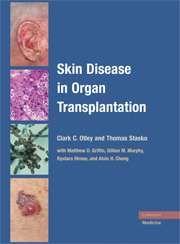Book contents
- Frontmatter
- Contents
- List of Contributors
- Foreword by Daniel R. Salomon
- Foreword by Robin Marks
- Foreword by Kathy Schwab
- Preface
- Acknowledgments
- SECTION ONE TRANSPLANT DERMATOLOGY: AN EVOLVING DYNAMIC FIELD
- Section Two Transplant Medicine and Dermatology
- Section Three Pathogenic Factors in Transplant Dermatology
- Section Four Cutaneous Effects of Immunosuppressive Medications
- Section Five Infectious Diseases of the Skin in Transplant Dermatology
- Section Six Benign and Inflammatory Skin Diseases in Transplant Dermatology
- Section Seven Cutaneous Oncology in Transplant Dermatology
- Section Eight Special Scenarios in Transplant Cutaneous Oncology
- 32 Metastatic Squamous Cell Carcinoma in Organ Transplant Recipients
- 33 In-Transit Metastatic Squamous Cell Carcinoma in Organ Transplant Recipients
- 34 Metastatic Malignant Melanoma in Organ Transplant Recipients
- 35 Transplant Scalp: Severe Actinic Damage of the Scalp in Organ Transplant Recipients
- 36 Transplant Lip: Severe Actinic Damage of the Vermilion in Organ Transplant Recipients
- 37 Transplant Hands: Severe Actinic Damage of the Hands in Organ Transplant Recipients
- 38 Skin Cancer and Nevi in Pediatric Organ Transplant Recipients
- 39 Dermatologic Surgery in Organ Transplant Recipients
- 40 Radiation Therapy in Organ Transplant Recipients
- 41 Reduction of Immunosuppression for Transplant-Associated Skin Cancer
- 42 Systemic Retinoids for Prevention of Skin Cancer in Organ Transplant Recipients
- 43 Topical Treatment of Actinic Keratosis and Photodamage in Organ Transplant Recipients
- 44 Imiquimod Use in Organ Transplant Recipients
- 45 Photodynamic Therapy in Organ Transplant Recipients
- 46 Skin Cancer Prevention and Photoprotection in Organ Transplant Recipients
- 47 Skin Cancer Prior to Organ Transplantation or Organ Donation
- Section Nine Educational, Organizational, and Research Efforts in Transplant Dermatology
- Index
32 - Metastatic Squamous Cell Carcinoma in Organ Transplant Recipients
from Section Eight - Special Scenarios in Transplant Cutaneous Oncology
Published online by Cambridge University Press: 18 January 2010
- Frontmatter
- Contents
- List of Contributors
- Foreword by Daniel R. Salomon
- Foreword by Robin Marks
- Foreword by Kathy Schwab
- Preface
- Acknowledgments
- SECTION ONE TRANSPLANT DERMATOLOGY: AN EVOLVING DYNAMIC FIELD
- Section Two Transplant Medicine and Dermatology
- Section Three Pathogenic Factors in Transplant Dermatology
- Section Four Cutaneous Effects of Immunosuppressive Medications
- Section Five Infectious Diseases of the Skin in Transplant Dermatology
- Section Six Benign and Inflammatory Skin Diseases in Transplant Dermatology
- Section Seven Cutaneous Oncology in Transplant Dermatology
- Section Eight Special Scenarios in Transplant Cutaneous Oncology
- 32 Metastatic Squamous Cell Carcinoma in Organ Transplant Recipients
- 33 In-Transit Metastatic Squamous Cell Carcinoma in Organ Transplant Recipients
- 34 Metastatic Malignant Melanoma in Organ Transplant Recipients
- 35 Transplant Scalp: Severe Actinic Damage of the Scalp in Organ Transplant Recipients
- 36 Transplant Lip: Severe Actinic Damage of the Vermilion in Organ Transplant Recipients
- 37 Transplant Hands: Severe Actinic Damage of the Hands in Organ Transplant Recipients
- 38 Skin Cancer and Nevi in Pediatric Organ Transplant Recipients
- 39 Dermatologic Surgery in Organ Transplant Recipients
- 40 Radiation Therapy in Organ Transplant Recipients
- 41 Reduction of Immunosuppression for Transplant-Associated Skin Cancer
- 42 Systemic Retinoids for Prevention of Skin Cancer in Organ Transplant Recipients
- 43 Topical Treatment of Actinic Keratosis and Photodamage in Organ Transplant Recipients
- 44 Imiquimod Use in Organ Transplant Recipients
- 45 Photodynamic Therapy in Organ Transplant Recipients
- 46 Skin Cancer Prevention and Photoprotection in Organ Transplant Recipients
- 47 Skin Cancer Prior to Organ Transplantation or Organ Donation
- Section Nine Educational, Organizational, and Research Efforts in Transplant Dermatology
- Index
Summary
PATHOGENESIS
Organ transplant recipients (OTRs) are a special group of patients with important characteristics and unique medical needs. Because squamous cell carcinomas (SCC) in OTRs tend to be common, with more aggressive local invasion, early recurrence, and higher rates of metastases, the recognition and treatment of skin cancer, especially SCC, in these patients is becoming a more important aspect of their overall care. As OTRs live longer with better antirejection regimens, the incidence of metastatic SCC in these patients will most likely increase.
The pathogenesis of malignancies, specifically SCC in OTRs, is multifactorial. The immunosuppression required in OTRs is a well-documented factor in the development of SCC and other malignancies. In fact, cancer of any type is three to four times more likely to develop in OTRs than in the general population. Immunosuppression not only predisposes OTRs to the development of SCC but also increases tumor aggressiveness, the chance of metastatic disease, and the possibility of death. The level and duration of immunosuppression is the single most important factor influencing malignant transformation and metastasis in OTRs. This is well illustrated by cardiac transplant patients, who generally receive higher levels of immunosuppression than recipients of other types of organ transplants and have the highest rate of SCC among OTRs. Moloney et al. postulated that immunosuppression can affect whether a local primary SCC transforms into a tumor with the potential to metastasize.
Immunosuppression may increase the incidence of SCC through at least two mechanisms.
- Type
- Chapter
- Information
- Skin Disease in Organ Transplantation , pp. 217 - 223Publisher: Cambridge University PressPrint publication year: 2008



